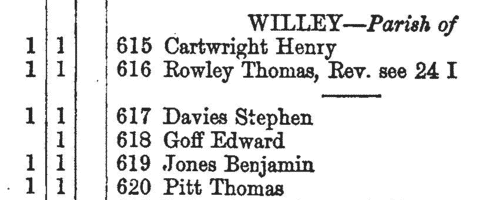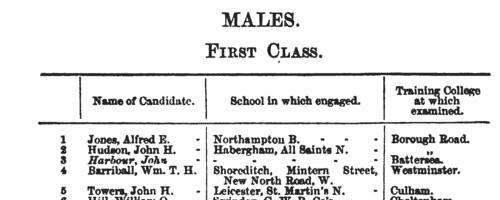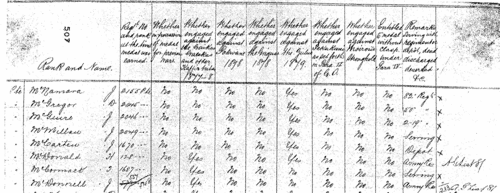Rainford Surname Ancestry ResultsOur indexes 1000-1999 include entries for the spelling 'rainford'. In the period you have requested, we have the following 109 records (displaying 51 to 60): Single Surname Subscription | | | Buying all 109 results of this search individually would cost £604.00. But you can have free access to all 109 records for a year, to view, to save and print, for £100. Save £504.00. More... |
These sample scans are from the original record. You will get scans of the full pages or articles where the surname you searched for has been found. Your web browser may prevent the sample windows from opening; in this case please change your browser settings to allow pop-up windows from this site. Long-stay Paupers in Workhouses: Fylde
(1861)
This comprehensive return by the Poor Law Board for England and Wales in July 1861 revealed that of the 67,800 paupers aged 16 or over, exclusive of vagrants, then in the Board's workhouses, 14,216 (6,569 men, 7,647 women) had been inmates for a continuous period of five years and upwards. The return lists all these long-stay inmates from each of the 626 workhouses that had been existence for five years and more, giving full name; the amount of time that each had been in the workhouse (years and months); the reason assigned why the pauper in each case was unable to sustain himself or herself; and whether or not the pauper had been brought up in a district or workhouse school (very few had). The commonest reasons given for this long stay in the workhouse were: old age and infirm (3,331); infirm (2,565); idiot (1,565); weak mind (1,026); imbecile (997); and illness (493). RAINFORD. Cost: £6.00.  | Sample scan, click to enlarge

| Long-stay Paupers in Workhouses: Ormskirk
(1861)
This comprehensive return by the Poor Law Board for England and Wales in July 1861 revealed that of the 67,800 paupers aged 16 or over, exclusive of vagrants, then in the Board's workhouses, 14,216 (6,569 men, 7,647 women) had been inmates for a continuous period of five years and upwards. The return lists all these long-stay inmates from each of the 626 workhouses that had been existence for five years and more, giving full name; the amount of time that each had been in the workhouse (years and months); the reason assigned why the pauper in each case was unable to sustain himself or herself; and whether or not the pauper had been brought up in a district or workhouse school (very few had). The commonest reasons given for this long stay in the workhouse were: old age and infirm (3,331); infirm (2,565); idiot (1,565); weak mind (1,026); imbecile (997); and illness (493). RAINFORD. Cost: £6.00.  | Sample scan, click to enlarge

| Long-stay Paupers in Workhouses: West Derby (Lancashire)
(1861)
This comprehensive return by the Poor Law Board for England and Wales in July 1861 revealed that of the 67,800 paupers aged 16 or over, exclusive of vagrants, then in the Board's workhouses, 14,216 (6,569 men, 7,647 women) had been inmates for a continuous period of five years and upwards. The return lists all these long-stay inmates from each of the 626 workhouses that had been existence for five years and more, giving full name; the amount of time that each had been in the workhouse (years and months); the reason assigned why the pauper in each case was unable to sustain himself or herself; and whether or not the pauper had been brought up in a district or workhouse school (very few had). The commonest reasons given for this long stay in the workhouse were: old age and infirm (3,331); infirm (2,565); idiot (1,565); weak mind (1,026); imbecile (997); and illness (493). RAINFORD. Cost: £6.00.  | Sample scan, click to enlarge

| South Shropshire Poll Book: Ditton Priors
(1868)
The poll book of the election, November 1868, for the Southern Division of Shropshire, is arranged by polling district, and then by parish, township, &c., showing the votes cast (H, Herbert; C, Corbett; M, More), the number on the electoral register, and the full name of the voter, surname first. Where a person had voting qualification in more than one parish, the name is given in each place, but with a cross-reference to the parish list with the entry the vote(s) cast. At the head of each column of register numbers there is a letter in bold indicating the polling district - A, Bishop's Castle; B, Bridgnorth; C, Church Stretton; D, Cleobury Mortimer; E, Clun; F, Ludlow; G, Pontesbury; H, Shiffnal; I, Wenlock.RAINFORD. Cost: £6.00.  | Sample scan, click to enlarge

| Patentees of New Inventions
(1870)
Index of patentees and applicants for patents of inventions in 1870: giving full name of patentee (surname first); number of patent (in bold); date (within 1870); and subject-matter. Where the patentee was acting as agent for third parties, their names are given in italics in the subject-matter column.RAINFORD. Cost: £4.00.  | Sample scan, click to enlarge

| Trainee Schoolmasters in England and Wales
(1876)
The Education Department set examinations for candidates for admission into training colleges, and for the office of teacher. This is the list of successful male candidates from England and Wales at the examination in July 1876. The number in the first column shows order of merit in each class in the examination; then there is the name of the candidate (surname, christian name and any intermediate initial(s)), the school in which engaged, and the training college at which examined. The names of pupil teachers are shown in italics, with the 'school in which engaged' column left blank. These abbreviations are used in the names of schools: B., British; Bd., Board; Ch., Church of England; N., National; P., Parochial; R. C., Roman Catholic; U., Poor Law Union; W., Wesleyan Methodist.RAINFORD. Cost: £6.00.  | Sample scan, click to enlarge

|  Men of the 21st Regiment of Foot (Royal Scots Fusiliers) fighting in South Africa
(1877-1879) Men of the 21st Regiment of Foot (Royal Scots Fusiliers) fighting in South Africa
(1877-1879)
What is commonly called the Zulu War Medal was awarded to those British soldiers who fought in a series of conflicts in southern Africa from 1877 (the Kaffir War) through to 1879 (the Zulu War). In 1880 the various units submitted returns of the officers, non-commissioned officers and men 'entitled to the Medal for Military Operations in South Africa during 1877-8-9' and these 'medal rolls' are now in the National Archives. The returns are made with the information arranged in twelve columns:
1. Rank and name
2. Regimental number and rank at the time the medal was earned
3. Whether in possession of medal for previous wars
4. Whether engaged against the Gaikas, Galekas and other Kaffir tribes 1877-8
5. Whether engaged against Pokwane 1878
6. Whether engaged against the Griquas 1878
7. Whether engaged against the Zulus 1879
8. Whether engaged against Sekukuni as set forth in Par. 2. G. O.
9. Whether engaged against Moirosi's stronghold
10. Entitled to medal without clasp under Par. 4.
11. Serving with regiment, depot, dead, discharged, deserted, &c.
12. Notes and cross-references to the Adjutant-General's medal lists.
WO 100/46.
RAINFORD. Cost: £8.00.  | Sample scan, click to enlarge

| Debtors
(1880)
Bills of sale (binding assets to a creditor/lender) in England and Wales, October to December 1880RAINFORD. Cost: £6.00.  | Sample scan, click to enlarge

| Debtors, Insolvents and Bankrupts
(1880)
Bills of sale (binding assets to a creditor/lender), insolvencies and bankruptcies in England and Wales, April to June 1880RAINFORD. Cost: £6.00.  | Sample scan, click to enlarge

| Elementary Teachers in Grimsby
(1880)
The National Union of Elementary Teachers, established in 1870, brought together members of the profession throughout England and Wales, organized in local Teachers' Associations. Lists of members of the associations were printed in the annual reports. Each association's officers are listed first, then the ordinary members. Surnames are given, Mr/Mrs/Miss, initial(s), and the name of the school - B. S., British School; Bd. S., Board School; Congl. S., Congregational School; End. S., Endowed School; Gr. S., Grammar School; N. S., National School; Par. S., Parochial School; Pres. S., Presbyterian School; R. C. S., Roman Catholic School; Undl. S., Undenominational School; W. S., Wesleyan School.RAINFORD. Cost: £6.00.  | Sample scan, click to enlarge

|
Research your ancestry, family history, genealogy and one-name study by direct access to original records and archives indexed by surname.
|













